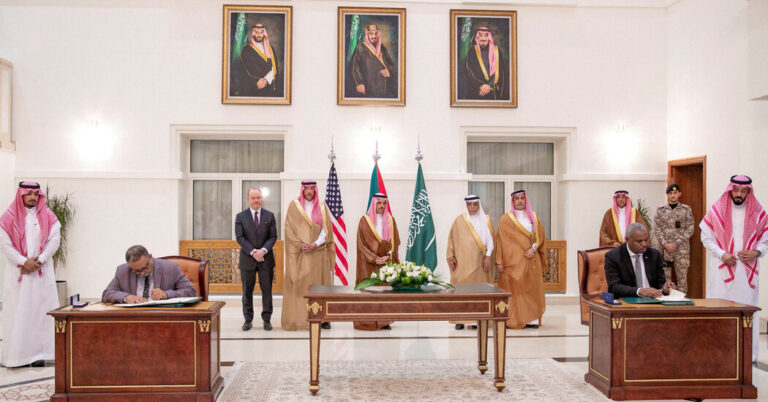Sudan’s warring parties have agreed to a seven-day cease-fire beginning on Monday, Saudi Arabia and the United States announced late Saturday, the first truce to be signed by both parties in a conflict that has raged for over a month, leaving millions of people across the northeast African nation in a dire humanitarian crisis.
The truce was announced more than two weeks after representatives of the rival factions — the Sudanese Army controlled by Gen. Abdel Fattah al-Burhan, and the paramilitary Rapid Support Forces led by Lt. Gen. Mohamed Hamdan — began talks in the Saudi port city of Jeddah.
On Saturday, the sides promised to stop their forces from occupying new areas; to refrain from detaining or threatening civilians; and not to impede aid groups and workers from providing lifesaving assistance. The warring groups also agreed not to loot civilian properties or humanitarian supplies, nor to seize critical infrastructure such as electricity, fuel and water installations.
Before the announcement, the two sides had signed a pact only to protect civilians but not to suspend fighting altogether, leaving their soldiers clashing across Sudan. Previous cease-fire announcements, including one brokered by the United States and another by South Sudan, have faltered, leading to a mounting death toll and a vast displacement of people.
To ensure that the latest cease-fire holds, a monitoring committee consisting of representatives from Saudi Arabia, the United States and the warring factions will be established. The committee will liaise with the warring sides and with aid agencies to make sure that the cease-fire terms are being respected and to investigate any violations.
The agreement late Saturday came after U.S. Secretary of State Antony J. Blinken spoke with General al-Burhan about efforts to stop the fighting and restore essential services. Mr. Blinken urged both sides to uphold the truce to deliver humanitarian aid for the millions of Sudanese suffering after more than five weeks of fighting between the generals’ forces.
“It is past time to silence the guns and allow unhindered humanitarian access,” Mr. Blinken said on Twitter, adding, “the eyes of the world are watching.”
The signing of the agreement came just hours after fighting intensified in the capital, Khartoum, and the adjacent cities of Omdurman and Bahri, with residents reporting incessant gunfire in some neighborhoods and shelling by warplanes.
Violent clashes have also raged in recent days across the city of Nyala, the capital of South Darfur State, in defiance of a truce mediated by local activists and grass-roots organizations. Hundreds of people have also been killed and at least 85,000 others displaced in El Geneina in West Darfur, a region where ethnic violence and indiscriminate killing have surged in recent years.
At least 850 people have been killed since the conflict began on April 15, according to the Sudanese doctors’ union, with about 3,400 injured. Some 60 hospitals have ceased to function across the country, the union said, while dozens of others have come under shelling or forced clearance by the warring forces — threatening an already-fragile health care system. Looting has become pervasive, with hospitals, banks and embassies all coming under assault in recent weeks.
More than a million people have been displaced in and outside the country, the United Nations has said, with more than half of the country’s 48 million people now in dire need of humanitarian assistance. The United Nations has appealed for $2.6 billion to help them. On Friday, the United States announced $103 million to help Sudan and neighboring nations deal with the worsening situation.



